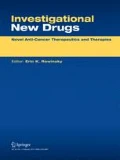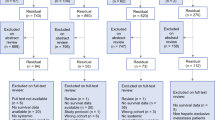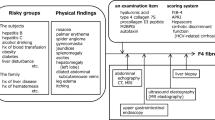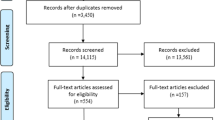Summary
Introduction The goal of organ dysfunction Phase I trials is to characterize the safety and pharmacokinetics of novel agents in cancer patients with liver or kidney dysfunction, but the clinical benefit is not well established. Methods We reviewed 170 patients across 15 liver dysfunction studies at our institution, grouped based on the NCI-Organ Dysfunction Working Group criteria or Child-Pugh Score. Results The median survival for the entire cohort was two months and just one month amongst patients with severe liver dysfunction. Patients with normal or mild liver dysfunction, absence of tumor in liver, good performance status, higher serum albumin and lower bilirubin, aspartate transaminase and alkaline phosphatase had improved survival by univariate analysis. Serum albumin and liver function classification remained significant by multivariate analysis. Conclusion Given poor survival of patients with liver dysfunction, we need better criteria, such as albumin levels, for optimally selecting patients for liver dysfunction studies.

Similar content being viewed by others
References
Khan KH, Yap TA, Ring A, Molife LR, Bodla S, Thomas K, Zivi A, Smith A, Judson I, Banerji U, de Bono JS, Kaye SB (2016) Phase I trial outcomes in older patients with advanced solid tumours. Br J Cancer 114(3):262–268. doi:10.1038/bjc.2015.477
Italiano A, Massard C, Bahleda R, Vataire AL, Deutsch E, Magne N, Pignon JP, Vassal G, Armand JP, Soria JC (2008) Treatment outcome and survival in participants of phase I oncology trials carried out from 2003 to 2006 at Institut Gustave Roussy. Ann oncol: Off J Eur Soc Med Oncol/ESMO 19(4):787–792. doi:10.1093/annonc/mdm548
Olmos D, A'Hern RP, Marsoni S, Morales R, Gomez-Roca C, Verweij J, Voest EE, Schöffski P, Ang JE, Penel N, Schellens JH, del Conte G, Brunetto AT, Evans TRJ, Wilson R, Gallerani E, Plummer R, Tabernero J, Soria J-C, Kaye SB (2012) Patient selection for oncology phase I trials: a multi-institutional study of prognostic factors. J Clin Oncol 30(9):996–1004. doi:10.1200/jco.2010.34.5074
Arkenau HT, Olmos D, Ang JE, de Bono J, Judson I, Kaye S (2008) Clinical outcome and prognostic factors for patients treated within the context of a phase I study: the Royal Marsden Hospital experience. Br J Cancer 98(6):1029–1033
Horstmann E, McCabe MS, Grochow L, Yamamoto S, Rubinstein L, Budd T, Shoemaker D, Emanuel EJ, Grady C (2005) Risks and benefits of phase 1 oncology trials 1991 through 2002. N Engl J Med 352(9):895–904. doi:10.1056/NEJMsa042220
FDA (2003) Pharmacokinetics in Patients with Impaired Hepatic Function: Study Design, Data Analysis, and Impact on Dosing and Labeling. http://www.fda.gov/downloads/Drugs/GuidanceComplianceRegulatoryInformation/Guidances/ucm072123.pdf. Accessed August 13 2016
EMA (2005) Guideline on the evaluation of the pharmacokinetics of medicinal products in patients with impaired hepatic function. http://www.emea.europa.eu/docs/en_GB/document_library/Scientific_guideline/2009/09/WC500003122.pdf. Accessed August 13 2016
Synold TW, Takimoto CH, Doroshow JH, Gandara D, Mani S, Remick SC, Mulkerin DL, Hamilton A, Sharma S, Ramanathan RK, Lenz HJ, Graham M, Longmate J, Kaufman BM, Ivy P (2007) Dose-escalating and pharmacologic study of Oxaliplatin in adult cancer patients with impaired hepatic function: a National Cancer Institute organ dysfunction working group study. Clin Cancer Res 13(12):3660–3666. doi:10.1158/1078-0432.ccr-06-2385
Pugh RN, Murray-Lyon IM, Dawson JL, Pietroni MC, Williams R (1973) Transection of the oesophagus for bleeding oesophageal varices. Br J Surg 60(8):646–649
Takimoto CH, Liu PY, Lenz H, Remick S, Mulkerin D, Mani S, Synold TW, Ramanathan RK, Ivy P, Davies AM, Grp SWO (2006) A phase I pharmacokinetic (PK) study of the Epothilone B analogue, ixabepilone (BMS-247550) in patients (pts) with advanced malignancies and varying degrees of hepatic impairment. A SWOG early therapeutics committee and NCI organ dysfunction working group trial. J Clin Oncol 24(18):80S–80S
Reid TR, Takimoto CH, Verschraegen CF, Sarantopoulos J, Cheung W, Allen-Freda E, Li J, Xu Y, Ko J, Johri A (2008) Evaluation of safety, tolerability and pharmacokinetics (PK) of patupilone in patients (pts) with advanced solid tumors and varying degrees of hepatic function: an open-label phase I study. J Clin Oncol 26(15)
Ramalingam SS, Kummar S, Sarantopoulos J, Shibata S, LoRusso P, Yerk M, Holleran J, Lin Y, Beumer JH, Harvey RD, Ivy SP, Belani CP, Egorin MJ (2010) Phase I study of Vorinostat in patients with advanced solid tumors and hepatic dysfunction: a National Cancer Institute organ dysfunction working group study. J Clin Oncol 28(29):4507–4512. doi:10.1200/jco.2010.30.2307
Mahalingam D, Sarantopoulos J, Gordon MS, Pandya NB, Tan BR, Mita AC, Zergebel C, Saito K, Takimoto CH, Saif MW (2011) Phase I study evaluating the pharmacokinetics (PK) of components of S-1 in patients with impaired hepatic function. J Clin Oncol 29(15)
Sarantopoulos J, Lenz H, LoRusso P, Shibata S, Kummar S, Mulkerin D, Ramanathan RK, Mita MM, O'Rourke P, Remick SC, Goel S, Gutierrez M, Ramalingam SS, Murgo A, Davies AM, Mani S, Boni J, Shapiro M, Ivy SP, Takimoto CH, Natl Canc Inst Organ D (2011) Phase I pharmacokinetic study of temsirolimus (CCI-779) in patients with advanced malignancies and normal and impaired liver function: an NCI organ dysfunction working group (ODWG) study. J Clin Oncol 29(15)
LoRusso PM, Venkatakrishnan K, Ramanathan RK, Sarantopoulos J, Mulkerin D, Shibata SI, Hamilton A, Dowlati A, Mani S, Rudek MA, Takimoto CH, Neuwirth R, Esseltine DL, Ivy P (2012) Pharmacokinetics and safety of bortezomib in patients with advanced malignancies and varying degrees of liver dysfunction: phase I NCI Organ Dysfunction Working Group Study NCI-6432. Clin Cancer Res: Off J Amer Assoc Cancer Res 18(10):2954–2963. doi:10.1158/1078-0432.CCR-11-2873
Sarantopoulos J, Hoering A, Synold TW, Mahalingam D, Wang D, Lenz HJ, O'Rourke P, Sexton R, Van Veldhuizen PJ, Mita MM, Wong L, Mita AC, El-Khoueiry AB, Chung VM, Gandara DR, Tejwani S, Takebe N, Takimoto CHM, Ivy SP, Kurzrock R (2012) Phase I pharmacokinetic study of dasatinib (BMS-354825) in patients with advanced malignancies and varying levels of liver dysfunction: S0711, a SWOG early therapeutics committee study. J Clin Oncol 30(15)
Shibata SI, Chung V, Synold TW, Longmate JA, Suttle AB, Ottesen LH, Lenz HJ, Kummar S, Harvey RD, Hamilton AL, O'Neil BH, Sarantopoulos J, LoRusso P, Rudek MA, Dowlati A, Mulkerin DL, Belani CP, Gandhi L, Lau SC, Ivy SP, Newman EM (2013) Phase I study of pazopanib in patients with advanced solid tumors and hepatic dysfunction: a National Cancer Institute organ dysfunction working group study. Clin Can Res: Off J Amer Assoc Cancer Res 19(13):3631–3639. doi:10.1158/1078-0432.CCR-12-3214
Mansfield AS, Vulih D, Smith GL, Harris PJ, Ivy SP (2015) Patterns of hepatic impairment in phase I clinical trials. J Clin Oncol 33(15)
Mansfield AS, Rudek MA, Vulih D, Smith GL, Harris PJ, Ivy SP (2016) The effect of hepatic impairment on outcomes in phase 1 clinical trials in cancer subjects. Amer Assoc Cancer Res. doi:10.1158/1078-0432.ccr-16-0449
Beumer JH, Ding F, Tawbi H, Lin Y, Viluh D, Chatterjee I, Rinker M, Chow SL, Ivy SP (2016) Effect of renal dysfunction on toxicity in three decades of cancer therapy evaluation program–sponsored single-agent phase I studies. J Clin Oncol 34(2):110–116. doi:10.1200/jco.2014.59.7302
Garrido-Laguna I, Janku F, Vaklavas C, Falchook GS, Fu S, Hong DS, Naing A, Tsimberidou AM, Wen S, Kurzrock R (2012) Validation of the royal marsden hospital prognostic score in patients treated in the phase I clinical trials program at the MD Anderson Cancer Center. Cancer 118(5):1422–1428. doi:10.1002/cncr.26413
Wheler J, Tsimberidou AM, Hong D, Naing A, Falchook G, Piha-Paul S, Fu S, Moulder S, Stephen B, Wen S, Kurzrock R (2012) Survival of 1,181 patients in a phase I clinic: the MD Anderson Clinical Center for targeted therapy experience. Clin Cancer Res 18(10):2922–2929. doi:10.1158/1078-0432.ccr-11-2217
Wheler J, Tsimberidou AM, Hong D, Naing A, Jackson T, Liu S, Feng L, Kurzrock R (2009) Survival of patients in a phase 1 clinic. Cancer 115(5):1091–1099. doi:10.1002/cncr.24018
Patel H, Egorin MJ, Remick SC, Mulkerin D, Takimoto CHM, Doroshow JH, Potter D, Ivy SP, Murgo AJ, Ramanathan RK (2004) Comparison of Child-Pugh (CP) criteria and NCI organ dysfunction working group (NCI-ODWG) criteria for hepatic dysfunction (HD): Implications for chemotherapy dosing. J Clin Oncol (Meeting Abstracts) 22 (14_suppl):6051
Pregelj L, Verreynne M-L, Hine D (2015) Changes in clinical trial length. Nat Rev Drug Discov 14 (5):307–308. doi:10.1038/nrd4611 http://www.nature.com/nrd/journal/v14/n5/abs/nrd4611.html - supplementary-information
Pawlowski J, Malik L, Mahalingam D (2015) Advanced cancer Patients understanding and perceptions of phase I clinical trials. Cancer Investig 33(10):490–495. doi:10.3109/07357907.2015.1069833
Acknowledgements
We would like to thank all patients and their families for participating in the studies. We would also like to thank the office of regulatory affairs at CTRC their help with patient identification.
Disclaimer: This work has been presented in part at the ASCO 2014 Annual Meeting (abstract 2536).
Author information
Authors and Affiliations
Corresponding author
Ethics declarations
Funding
No funding was received for completion of this project. Christos Fountzilas is a recipient of a Cancer Research Training Award from the Cancer Prevention and Research Institute of Texas (RP140105). Sukeshi Patel has funding from P30AG044271. All authors are supported by the P30 Cancer Center Support Grant from the National Cancer Institute (CA054174).
Ethical approval
All procedures performed in studies involving human participants were in accordance with the ethical standards of the institutional and/or national research committee and with the 1964 Helsinki declaration and its later amendments or comparable ethical standards. For this type of study formal consent is not required.
Conflict of interest
The authors indicate no potential conflicts of interest.
Informed consent
All patients participated in clinical studies approved by the University of Texas Health Science Center at San Antonio Institutional Review Board. Individual consent was not required for this retrospective review.
Electronic supplementary material
ESM 1
(DOCX 90 kb)
Rights and permissions
About this article
Cite this article
Fountzilas, C., Stuart, S., Hernandez, B. et al. Risks and benefits of phase I liver dysfunction studies: should patients with severe liver dysfunction be included in these trials?. Invest New Drugs 35, 386–391 (2017). https://doi.org/10.1007/s10637-017-0425-4
Received:
Accepted:
Published:
Issue Date:
DOI: https://doi.org/10.1007/s10637-017-0425-4




